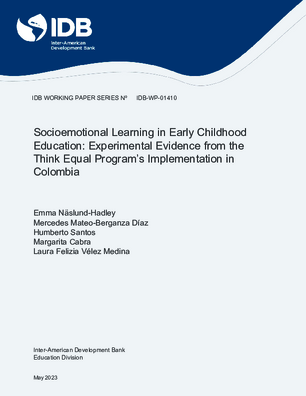Socioemotional Learning in Early Childhood Education: Experimental Evidence from the Think Equal Program’s Implementation in Colombia
Date
May 2023
In this article we experimentally evaluate Colombia’s Think Equal program, which teaches socioemotional skills to children ages 3 to 6. Given the context of COVID-19, the original design was adapted as a hybrid model, alternating in-person and remote instruction and engaging families in the implementation of the curriculum. We found that the program had positive effects on children’s prosocial behavior, self-awareness, and cognitive learning. The intervention also had an impact on education centers personnel (community mothers) and caregivers implementing the activities. Treated community mothers had higher levels of empathy, lower negative health symptoms, better pedagogical practices, and a closer relationship with the children’s caregivers compared with those in the control group. Treated caregivers had better stimulation practices and lower negative health symptoms compared with those in the control group. These findings suggest that a well-designed intervention has the potential to develop socioemotional skills in children at an early age and, at the same time, to develop capacities in those who implement the activities. Our results have important implications for the design, implementation, and evaluation of early childhood socioemotional learning programs and provide novel evidence about the challenges faced by interventions combining face-to-face and remote learning.




